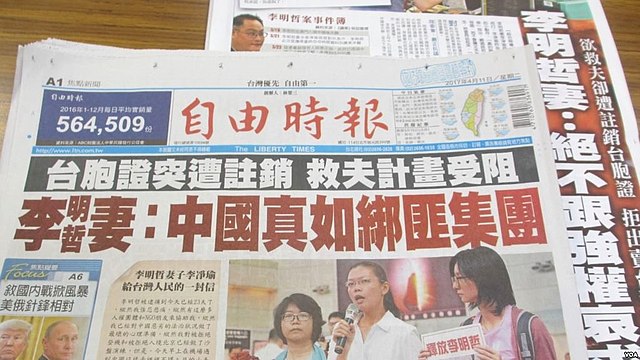Imperfect Information and Censorship: Media’s Imperative (March)
In March 2019, the Rights Writers explore the role the media has played in covering their issues and what effects it has had — positive and negative.
Free and independent media is crucial in their roles to inform the public and to serve as watchdogs for abuse by those in power. In China, however, these roles are not able to be realized, as the Chinese Communist Party (CCP) heavily controls the various news sources and censors the internet.
In 2017, Freedom House rated Chinese Press Freedom as “Not Free”, with a score of 87 out of 100. Most media outlets are controlled by the state, while other sources of information are extremely limited through China’s vast and sophisticated censorship system. This lack of free and independent media within China dismantles an important actor for internal checking of the CCP’s human rights violations. Furthermore, restrictions on the flow of information, at best, gives the CCP plausible deniability on accusations of human rights violations by outside media and, at worst, prevents knowledge of abuses from even travelling outside China’s borders.

Despite the CCP’s iron grip on information in China, advancements in technology has also increased the ability for individuals, and commercial and government-funded media outlets in the West to uncover and report on incidents of human rights violation. For example, in the case of China’s internment of over a million Muslim minority in the Xinjiang Province, satellite imagery of the various camps, as well as testimonies from those that escaped detention, quickly debunked China’s initial denial of the existence of these internment camps. The evidence has since forced the CCP to change their narrative to instead acknowledge the existence of these camps, even though the Party has instead opted to call them political reeducation and vocational training centers. Unfortunately, measurable impacts of media coverage of human rights abuses in China has mostly been limited to this type of narrative change, often expressed through China’s state-run media outlets. The one outlier and important turning point in the relationship of Western world powers and public with China stemmed from the reporting after the Tiananmen Square Massacre in 1989. Just months before the event, 72% of Americans expressed a very or mostly favorable view of China; the number dropped to 34% after the massacre. Today, however, even with extensive reporting, Western countries have been unwilling to go beyond verbal condemnation of China’s record on human rights.

Thanks to the limits on outward information flow, the CCP has often accused Western media of false reporting, and over-coverage and unfair biases against China regarding human rights. China’s accusations of false reporting are not entirely credible. In the example of Uighur internment, China initially called the reports “completely untrue” but then later admitted the camps’ existence. Furthermore, many articles by Western media outlets contain the same accounts of China’s human rights violations as official government reports, such as those from the U.S. State Department. Furthermore, coverage of China’s human rights violations is not overly abundant, even if it is largely critical. While China’s critiques of Western media fall flat, there are legitimate concerns and shortcomings of the media’s reporting when viewed through from a human rights perspective. The main criticism is the decrease in the reporting on human rights in China in favor of an increase in reporting on economic relations. If the role of the media is viewed as an agenda-setter, the increasingly economy-focused reporting signals to the public that human rights are less important than the economy. Indeed, concerns about human rights in China as a “very serious problem” ranks 7th in a Pew Research Poll, with five of the six issues deemed more important being related to the economy and national security. Furthermore, because the media is not completely independent—it must be funded somehow—the stories that news outlets lean towards covering are those that most likely attract the attention of readers. This means more stories related to domestic issues and more stories about the economy—thus a vicious cycle is born. The public is perceived to be more concerned with the economic and security relations between China and the West, therefore likely biasing the media to coverage of the economy and security.
Although concerns over the economy and national security are legitimate and important, decades of prioritizing them over human rights is responsible for the continued lack of accountability of the CCP’s actions. The media is complicit with its decreased coverage of ethical issues. The ideal coverage by the media when the foremost priority is to decrease human rights violations in China is the continuous coverage and intense and thorough investigations of the CCP’s actions. Unfortunately, such ideals are not pragmatic in the face of realistic concerns of resource distribution. News cannot (and indeed should not) focus only on human rights and cover nothing else. Nonetheless, in order to restore a sense of priority and importance of human rights to the public when interacting with China, the media must increase its coverage of the impacts and implications of the CCP’s human rights violations. It is time for the media to embrace their role as educator and watchdog.
